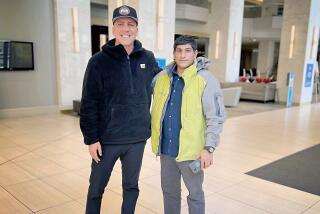Informed Opinions on Today’s Topics : The Qualities That Make an American Hero
- Share via
America rejoiced last Thursday when U. S. pilot Capt. Scott F. O’Grady, whose F-16 fighter was shot down by a Bosnian Serb missile, emerged virtually unscathed after spending nearly a week in Bosnian Serb-held territory.
Given images of an exuberant O’Grady waving a loaded pistol toward the sky as he ran out of a Bosnia-Herzogovina forest toward the U. S. Marine helicopter sent to rescue him, the country gasped in relief at avoiding what might have developed into a convincing argument for American involvement in the Bosnian turmoil.
Realizing the diplomatic web the United States could have been embroiled in if O’Grady had either died or been captured by the Bosnian Serbs, President Clinton called the 29-year-old pilot “an American hero.”
Upon discovering that the whole country had rallied around his six-day effort to stay alive, O’Grady politely refused the President’s moniker. “Naw, I’m not a hero,” he said. “All I was was a scared little bunny rabbit trying to hide, trying to survive.”
His ability to both avoid capture and stay alive, he said, was due to extensive military training.
The real heroes, O’Grady said, are the Marines who risked their own lives to rescue him. For his part, he said, he almost blew the rescue operation.
“The funny thing is the one thing they teach you is . . . never run at a helicopter with a loaded gun.”
What defines an American hero today?
Harvey Rich, chairman, Cal State Northridge sociology department:
“An American hero is someone who has made a major impact on the country, with lasting cultural implications. I wouldn’t see [O’Grady] as an American hero, just someone who was a great person for the moment. There is a craving in the American public for some sort of genuine person with a lasting value. Because of the current turbulence of our society and the fact that most leaders tend to be degraded over time, heroes don’t last that long anymore. O’Grady is a symbol of thatsearch for greatness.”
Patricia G. Siever, Pierce College history instructor:
“A hero is someone who does not consciously think of himself during an emergency situation or who has a well-preserved sense of commitment and purpose all other times. Historically, heroes have been those who did not stray from their sense of commitment. [O’Grady] was committed to survive under adverse circumstances and served a purpose for us by doing so. Our whole position in Bosnia was in question. But there are people doing heroic things every day who are never noticed. Those are people working toward the survival of their families.”
Hugh Travis, Scout executive, Western Los Angeles Boy Scouts of America:
“Awards for heroism in the Boy Scouts come from single acts of valor. [O’Grady] was heroic in being able to keep from falling prey to the groups that were after him and in using his training to save his own life. But the real heroes are those who risked their own lives to save his. Just as firemen and other rescue personnel risked their lives to save others during the Northridge quake. Heroism is instinctive. By following his instincts to survive, O’Grady allowed the Marines to instinctively move in to rescue him.”
Martha Thomas, spokeswoman, DC Comics:
“If you look at super-heroes, you’ll find they are people who, by learning about their strengths and weaknesses, make the best out of the situation. They realize the needs of the community are more important than their own personal gains.”
More to Read
Sign up for Essential California
The most important California stories and recommendations in your inbox every morning.
You may occasionally receive promotional content from the Los Angeles Times.












